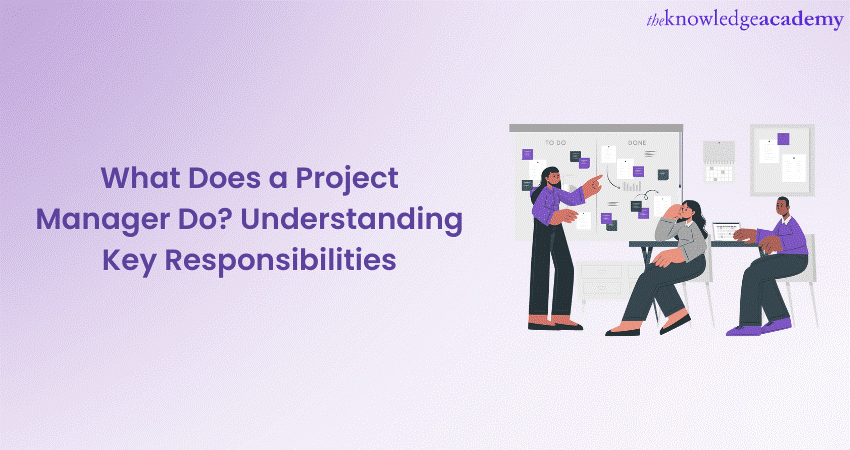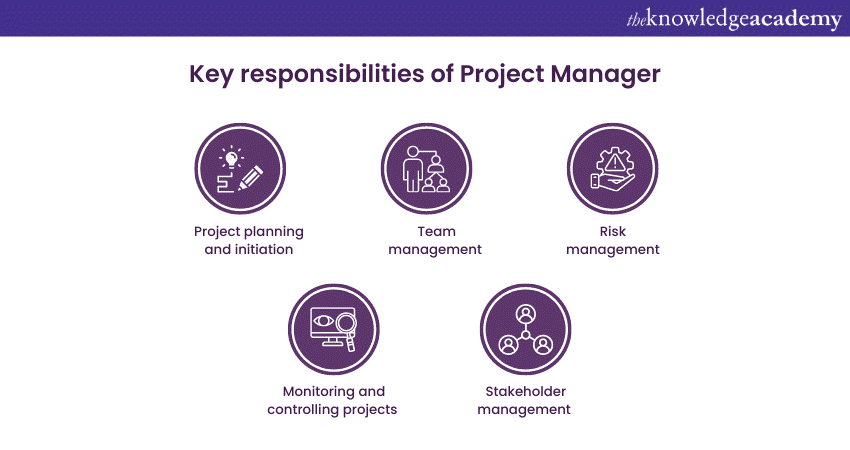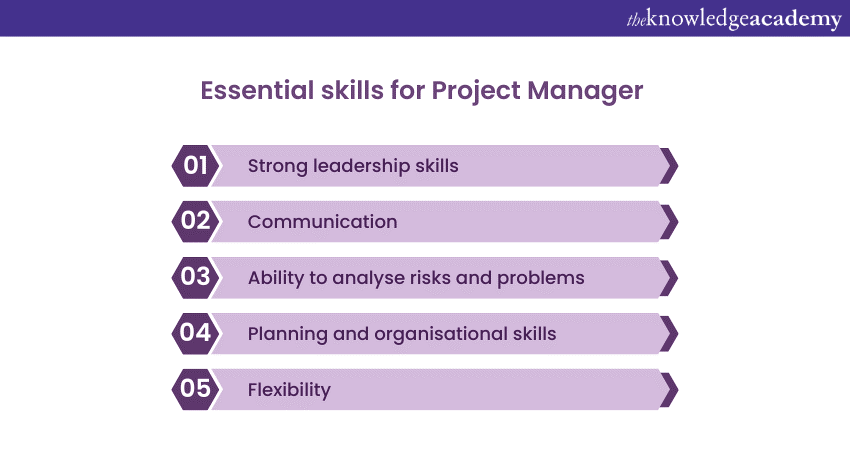We may not have the course you’re looking for. If you enquire or give us a call on +44 1344 203 999 and speak to our training experts, we may still be able to help with your training requirements.
Training Outcomes Within Your Budget!
We ensure quality, budget-alignment, and timely delivery by our expert instructors.

In a competitive business landscape, the role of a Project Manager has become increasingly vital for organisations aiming to achieve successful project outcomes. You might wonder, "What Does a Project Manager Do?" They serve as the driving force behind project execution and ensure that goals are met, and stakeholders are satisfied.
According to Glassdoor, in the UK, the average salary of a Project Manager is £48,261, and in the USA, it is $78,119. To truly grasp the essence of their role, it is crucial to understand their key responsibilities and the skills required to excel in this dynamic field. This blog will explore What Does a Project Manager Do and help you gain a deep understanding of the roles, responsibilities, and skills.
Table of Contents
1) What does a Project Manager do?
2) Key responsibilities of a Project Manager
3) Essential Skills for Project Manager
4) Benefits of Project Manager
5) How to qualify as a Project Manager?
6) Conclusion
What does a Project Manager do?
At its core, a Project Manager is a skilled professional who oversees and manages projects from initiation to completion. Their role encompasses a broad range of activities, including planning, organising, leading, and controlling various aspects of a project.
They work closely with cross-functional teams, stakeholders, and clients to successfully deliver project objectives while adhering to predefined constraints such as time, budget, and quality. It may seem like they carry a lot of responsibilities, but what is their primary responsibility? It is to provide effective leadership throughout the project's duration.
By establishing a clear vision and fostering a collaborative environment, they inspire their teams to perform at their best and strive for excellence. They act as the central point of communication between various stakeholders, team members, and clients.
Successful Project Management relies heavily on meticulous planning and organisation. They are responsible for creating comprehensive project plans that outline the project's goals, objectives, and deliverables. They break down the project into manageable tasks, establish timelines and milestones, and allocate resources accordingly. Careful planning ensures that projects remain on track and are executed efficiently.
In addition to planning, they excel in organising project activities and resources. They assign responsibilities to team members, delegate tasks, and establish clear roles and expectations. They also help to create a framework that promotes collaboration, accountability, and smooth workflow by organising the project structure.

Key responsibilities of a Project Manager

To understand What Does Project Manager Do, it is essential to understand their responsibilities. They head a project and are directly responsible for its results. Here are their key responsibilities.
Project initiation
The project initiation phase marks the starting point of any project, and it is during this stage that Project Managers assume several critical responsibilities. They work closely with stakeholders and clients to define the project's objectives, scope, and desired outcomes. By conducting thorough feasibility studies, they assess the project's viability and identify potential risks and constraints.
During project initiation, they define precise project requirements, outline success criteria, and set realistic expectations. Additionally, they develop project charters or statements of work, which serve as a guiding document throughout the project's lifespan.
Understand the Waterfall technique and how it is used in project management with our comprehensive Waterfall Project Management Certification Course.
Project planning
At this stage, Project Managers break down the project into manageable tasks and create a Work Breakdown Structure (WBS) that provides a hierarchical view of the project's components. They assign responsibilities to team members based on their skills and expertise. They also develop a project schedule by considering the dependencies, milestones, and deadlines.
They must also identify and assess potential risks and develop strategies for risk mitigation. They have to consider various scenarios and develop contingency plans to address unexpected events that may arise during the project.
Team management
Effectively managing project teams is a crucial responsibility of Project Managers. They assemble cross-functional teams comprising individuals with diverse skill sets, experience, and expertise. They also assign tasks and responsibilities to team members, ensuring each member understands their role and contributions to the project's success.
Risk management
Project Managers are responsible for assessing the potential risks that may impact the project's timeline, budget, or quality and develop risk management strategies to minimise their impact. They can handle uncertainties effectively by conducting risk assessments and employing risk management techniques.
They collaborate with the team to develop risk response plans, including risk avoidance, transfer, mitigation, or acceptance strategies. Through vigilant risk management, such professionals ensure that the project remains on track and deviations are managed efficiently.
Learn what risk is, how to identify them, and understand the different types of risk with Risk Management Green Belt training.
Monitoring and control
Throughout the project's execution, Project Managers continuously monitor and control project activities to ensure adherence to the project plan. They track Key Performance Indicators (KPIs) such as progress, budget utilisation, and quality metrics to evaluate the project's health and performance.
Such professionals employ project management tools and techniques to monitor progress and identify any deviations from the plan. Regular project status meetings, progress reports, and performance reviews are conducted to maintain transparency and accountability.
Stakeholder management
Effective stakeholder management is a critical responsibility of Project Managers. They identify and engage stakeholders throughout the project life cycle, addressing their needs, expectations, and concerns.
They establish clear lines of communication with stakeholders and keep them informed about the project's progress, achievements, and potential challenges. They actively engage stakeholders in decision-making processes and seek their input and feedback.
Essential Skills for Project Manager

The role of a Project Manager is challenging and requires the individual to be highly skilled and experienced. The following are some of the primary Workplace Project Management Skills you must have to work in this role.
a) Leadership and communication: Strong leadership skills to motivate teams, foster collaboration, and effective communication abilities to ensure clear and transparent information flow.
b) Planning and organisation: Meticulous planning to break down complex projects, establish realistic timelines, and allocate resources efficiently while employing project management tools and methodologies.
c) Problem-solving and decision-making: Critical thinking skills to identify and address project challenges, analyse root causes, and make informed decisions that align with project objectives.
d) Adaptability and flexibility: Ability to adapt to changing project requirements, proactively manage risks, and find innovative solutions to unexpected challenges, ensuring projects remain on track.
Learn the essence of project management with our Project Management Masterclass course.
Benefits of Project Manager
Choosing a career in project management can be highly rewarding and offer numerous advantages. Whether you are considering a career change or starting your professional journey, these are some benefits of having a career in project management.
a) Diverse industry opportunities: Project management skills are in demand across industries, allowing career flexibility and exposure to various sectors.
b) Strong job prospects: The increasing recognition of effective project management creates a robust job market with ample career opportunities and growth potential.
c) Competitive salary potential: Project Managers are often well-compensated for their expertise, with the potential for higher salaries and attractive compensation packages.
d) Transferable skills: Project management equips you with versatile skills, including leadership, communication, problem-solving, and strategic thinking, applicable to different roles and industries.
e) Professional growth: Project management offers continuous learning opportunities, career advancement, and the potential to move into more senior positions.
Want to get a headstart in the world of project management? Introduction To Project Management Certification Course can help you.
How to Qualify as a Project Manager?
To qualify as a Project Manager, you can pursue certain educational and certification requirements to demonstrate your expertise in the field.
Formal Education
While it is not mandatory, a Bachelor’s degree in fields such as Business Administration or Engineering is considered the first Step to Building a Career in Project Management.
Project Management Certifications
You can pursue Project Management Certifications from renowned professional bodies like the Project Management Institute (PMI). Project Management Professional (PMP) or Certified Associate in Project Management (CAPM) are two of the most popular certifications for a Project Manager.
a) PMP: Ideal for experienced Project Managers, it requires project management experience, education, and passing the PMP exam.
b) CAPM: Suitable for newcomers, it demonstrates an understanding of fundamental project management concepts and serves as a stepping stone to PMP.
Conclusion
If you were wondering, "What Does a Project Manager Do?" this blog might have given you a comprehensive answer. Their leadership, communication, planning, and problem-solving skills are crucial for a project's success. Pursuing a career in project management offers diverse industry opportunities, strong job prospects, and competitive salaries. They contribute to achieving organisational goals and are an invaluable asset in today's business landscape.
Learn the skills you need to be a successful Project Manager and gain the internationally recognised CGPM certification with our Certified Global Project Manager (CGPM) training.
Frequently Asked Questions
Upcoming Project Management Resources Batches & Dates
Date
 Introduction to Project Management Course
Introduction to Project Management Course
Fri 10th Jan 2025
Fri 14th Mar 2025
Fri 9th May 2025
Fri 15th Aug 2025
Fri 10th Oct 2025
Fri 12th Dec 2025







 Top Rated Course
Top Rated Course


 If you wish to make any changes to your course, please
If you wish to make any changes to your course, please


